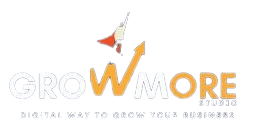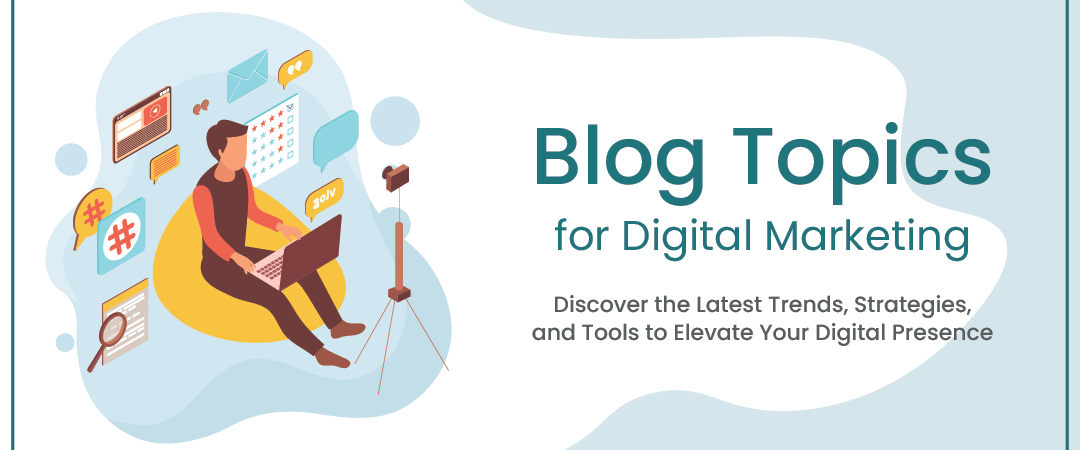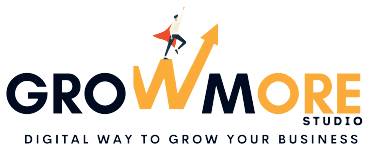Table of Contents
Digital Marketing Topics for Blog
The World is changing very fast and so is the technology used. On a daily basis, new techniques are evolving with which the people are not well versed. Moreover, there are few traditional digital marketing topics for blogs on which there are controversies and people what to know exactly what works in this era. So being a digital marketing agency you can take the initiative and clear doubt of many who are surfing google with confusion of how to get success by marketing thei content digitally. You can write detailed blog on these Digital Marketing Blog Topics ideas and get a massive traffic from google which will benefit your organisation in many ways.
So, Here are some of the best digital marketing blog topics to cover in 2024, along with their niches and low-difficulty keywords to target:
General Digital Marketing Basics
- Digital Marketing 101: Fundamentals for Beginners (low difficulty keywords: “digital marketing basics”, “digital marketing for beginners”)
- Essential Digital Marketing Skills to Master (low difficulty keywords: “digital marketing skills”, “digital marketing career”)
- Digital Marketing Trends to Watch in 2024 (low difficulty keywords: “digital marketing trends”, “digital marketing predictions”)
Search Engine Optimization (SEO)
- On-Page SEO: Optimizing Your Website for Search (low difficulty keywords: “on-page SEO”, “SEO best practices”)
- Off-Page SEO: Building Authority and Backlinks (low difficulty keywords: “off-page SEO”, “link building strategies”)
- Local SEO: Ranking Your Business in Local Search (low difficulty keywords: “local SEO”, “Google My Business optimization”)
Pay-Per-Click (PPC) Advertising
- PPC 101: Getting Started with Google Ads (low difficulty keywords: “Google Ads”, “PPC for beginners”)
- Mastering Ad Copy and Targeting (low difficulty keywords: “ad copy”, “PPC targeting”)
- PPC Optimization: Improving Your ROI (low difficulty keywords: “PPC optimization”, “PPC metrics”)
Social Media Marketing
- Social Media Marketing Strategy (low difficulty keywords: “social media marketing”, “social media strategy”)
- Creating Engaging Social Media Content (low difficulty keywords: “social media content”, “social media engagement”)
- Leveraging Influencer Marketing (low difficulty keywords: “influencer marketing”, “influencer outreach”)
Content Marketing
- Content Marketing 101: Developing a Content Strategy (low difficulty keywords: “content marketing”, “content strategy”)
- Creating Compelling Blog Content (low difficulty keywords: “blog writing”, “blog post ideas”)
- Optimizing Content for Search and Conversion (low difficulty keywords: “content optimization”, “content marketing ROI”)
Email Marketing
- Email Marketing Basics: Building Your List (low difficulty keywords: “email marketing”, “email list building”)
- Crafting Effective Email Campaigns (low difficulty keywords: “email campaigns”, “email marketing templates”)
- Measuring Email Marketing Success (low difficulty keywords: “email marketing metrics”, “email marketing ROI”)
Mobile Marketing
- Optimizing Your Website for Mobile (low difficulty keywords: “mobile optimization”, “responsive web design”)
- Leveraging Mobile Apps for Marketing (low difficulty keywords: “mobile apps”, “app store optimization”)
- SMS and Push Notifications for Marketing (low difficulty keywords: “SMS marketing”, “push notifications”)
Analytics and Measurement
- Google Analytics 101: Getting Started (low difficulty keywords: “Google Analytics”, “web analytics”)
- Measuring Marketing ROI (low difficulty keywords: “marketing ROI”, “marketing metrics”)
- Data-Driven Decision Making (low difficulty keywords: “data-driven marketing”, “marketing analytics”)
Industry News and Trends
- Latest Digital Marketing News (low difficulty keywords: “digital marketing news”, “marketing industry updates”)
- Emerging Technologies in Marketing (low difficulty keywords: “marketing technology”, “martech trends”)
- Case Studies and Success Stories (low difficulty keywords: “marketing case studies”, “marketing success stories”)
Ecommerce and Online Retail
- Optimizing Your Ecommerce Site for Conversions (low difficulty keywords: “ecommerce optimization”, “online store conversion rate”)
- Leveraging Social Media for Ecommerce (low difficulty keywords: “social media ecommerce”, “social commerce”)
- Mastering Product Photography and Videography (low difficulty keywords: “ecommerce product photography”, “product video marketing”)
Influencer Marketing
- Finding the Right Influencers for Your Brand (low difficulty keywords: “influencer marketing strategy”, “influencer outreach”)
- Measuring Influencer Marketing ROI (low difficulty keywords: “influencer marketing metrics”, “influencer campaign analytics”)
- Navigating FTC Regulations for Influencer Campaigns (low difficulty keywords: “influencer marketing regulations”, “FTC disclosure”)
Marketing Automation
- Marketing Automation 101: Getting Started (low difficulty keywords: “marketing automation”, “marketing automation tools”)
- Nurturing Leads with Automated Email Campaigns (low difficulty keywords: “lead nurturing”, “email marketing automation”)
- Integrating Chatbots and Conversational Marketing (low difficulty keywords: “chatbots marketing”, “conversational marketing”)
Video Marketing
- Creating Engaging Video Content (low difficulty keywords: “video marketing”, “video production tips”)
- Optimizing Videos for Search and Visibility (low difficulty keywords: “video SEO”, “YouTube marketing”)
- Leveraging Live Streaming and Webinars (low difficulty keywords: “live streaming marketing”, “webinar marketing”)
B2B Marketing
- Developing a Winning B2B Content Strategy (low difficulty keywords: “B2B content marketing”, “B2B lead generation”)
- Account-Based Marketing for B2B Success (low difficulty keywords: “account-based marketing”, “B2B personalization”)
- Mastering LinkedIn for B2B Networking and Sales (low difficulty keywords: “LinkedIn marketing”, “B2B social media”)
Marketing Analytics and Data
- Google Analytics Mastery for Marketers (low difficulty keywords: “Google Analytics”, “web analytics”)
- Leveraging Customer Data for Personalization (low difficulty keywords: “customer data platform”, “marketing personalization”)
- Predictive Analytics and AI in Marketing (low difficulty keywords: “predictive analytics”, “AI marketing”)
Programmatic Advertising
- Introduction to Programmatic Advertising (low difficulty keywords: “programmatic advertising”, “programmatic media buying”)
- Leveraging Programmatic for Targeted Display Ads (low difficulty keywords: “programmatic display ads”, “programmatic ad optimization”)
- Programmatic Video Advertising Strategies (low difficulty keywords: “programmatic video ads”, “connected TV advertising”)
Augmented Reality and Virtual Reality
- AR/VR in Digital Marketing: Immersive Experiences (low difficulty keywords: “AR marketing”, “VR marketing”)
- Integrating AR/VR into Your Marketing Mix (low difficulty keywords: “AR advertising”, “VR brand experiences”)
- Measuring the Impact of AR/VR Campaigns (low difficulty keywords: “AR marketing ROI”, “VR marketing metrics”)
Artificial Intelligence and Chatbots
- AI-Powered Chatbots for Customer Engagement (low difficulty keywords: “chatbots marketing”, “AI chatbots”)
- Using Machine Learning for Predictive Marketing (low difficulty keywords: “predictive analytics”, “AI marketing”)
- Ethical Considerations in AI-Driven Marketing (low difficulty keywords: “AI marketing ethics”, “algorithmic bias”)
Omnichannel Marketing
- Developing an Omnichannel Marketing Strategy (low difficulty keywords: “omnichannel marketing”, “multichannel marketing”)
- Personalizing the Customer Journey Across Channels (low difficulty keywords: “customer journey mapping”, “cross-channel personalization”)
- Measuring Omnichannel Marketing Performance (low difficulty keywords: “omnichannel marketing metrics”, “marketing attribution”)
Sustainability and Green Marketing
- Sustainable Digital Marketing Practices (low difficulty keywords: “sustainable marketing”, “green marketing”)
- Communicating Your Brand’s Environmental Initiatives (low difficulty keywords: “eco-friendly marketing”, “sustainability branding”)
- Measuring the Impact of Sustainable Marketing (low difficulty keywords: “green marketing ROI”, “environmental marketing metrics”)
B2C vs B2B Marketing Strategies
- Adapting Digital Marketing for B2C Audiences (low difficulty keywords: “B2C digital marketing”, “consumer marketing strategies”)
- Effective B2B Digital Marketing Tactics (low difficulty keywords: “B2B digital marketing”, “lead generation for B2B”)
- Measuring Success in B2C vs B2B Marketing (low difficulty keywords: “B2C marketing metrics”, “B2B marketing ROI”)
By covering these topics and targeting the suggested low-difficulty keywords, you can easily get enormous traffic from Google and can create a detailed and engaging digital marketing blog that solves the problem of your readers and provides value to your audience. Make sure to optimize your article for search engines, create visually appealing graphics, and promote your blog across different social media for maximum visibility and engagement. With proper SEO and unique content, you can easily rank for these keywords on Google SERP results.
Why a Digital Marketing Agency Needs a Blog Section
As a blogger, you may gain a lot from having a separate blog area on your website. These benefits include the ability to draw in and keep readers, build your reputation as an industry leader, and promote business expansion. Here’s why a digital marketing agency needs a blog section:
Thought Leadership and Credibility
A well-maintained blog allows your agency to showcase your expertise and thought leadership in the digital marketing space. You may establish your agency as a credible information source and gain the trust of prospective customers by continuously producing high-caliber, educational content.
Lead Generation and Conversion
A blog can serve as a powerful lead generation tool for your digital marketing agency. By creating valuable content that addresses the pain points and challenges of your target audience, you can attract potential clients to your website and nurture them through the sales funnel. Effective calls-to-action and lead capture forms can help convert blog visitors into qualified leads.
Search Engine Optimization (SEO)
A blog can be a crucial component of your agency’s SEO strategy. By targeting relevant keywords and creating optimized content, you can improve your website’s visibility in search engine results, making it easier for potential clients to find your services. Regular blog updates can also signal to search engines that your website is active and relevant.
Demonstrating Expertise and Services
Your blog can be used to showcase the breadth and depth of your digital marketing agency’s expertise. By covering a wide range of topics, from SEO and social media to content marketing and email campaigns, you can demonstrate your team’s capabilities and the value you can provide to clients.
Audience Engagement and Retention
A blog can help you build and maintain a loyal audience of clients and industry peers. By consistently publishing engaging, informative, and visually appealing content, you can keep your audience interested and coming back to your website. This can lead to increased brand awareness, trust, and long-term client relationships.
Repurposing and Content Amplification
The content you create for your blog can be repurposed and amplified across various marketing channels, such as social media, email newsletters, and guest posts. This can help you maximize the reach and impact of your digital marketing agency’s content, further enhancing your online presence and authority.
By incorporating a well-planned and regularly updated blog section into your digital marketing agency’s website, you can unlock a powerful tool for attracting and retaining clients, establishing your brand as a industry leader, and driving sustainable business growth.
What to Look for Before Choosing the Right Digital Marketing Blog Topics
When it comes to building a successful digital marketing blog, the choice of topics is crucial. The right topics can attract your target audience, establish your agency as an industry authority, and drive meaningful engagement. However, selecting the appropriate blog topics requires careful consideration. Here are some key factors to look for before choosing the right digital marketing blog topics:
1. Audience Relevance
The first and foremost consideration should be the relevance of the blog topics to your target audience. Conduct thorough research to understand the pain points, challenges, and interests of your ideal clients. Align your blog topics with their specific needs and preferences to ensure your content resonates with them.
2. Industry Trends and Emerging Technologies
Stay up-to-date with the latest trends and emerging technologies in the digital marketing landscape. Identify topics that address the evolving needs of your audience and showcase your agency’s expertise in these areas. This will position your blog as a go-to resource for cutting-edge insights and strategies.
3. Content Variety and Depth
Ensure your blog covers a diverse range of digital marketing topics, from foundational concepts to advanced strategies. Provide both breadth and depth in your content to cater to readers at different stages of their digital marketing journey.
4. Evergreen vs. Timely Topics
Balance your blog content between evergreen topics that retain their relevance over time and timely, trending topics that address the immediate concerns of your audience. This will ensure a steady stream of valuable content that keeps your readers engaged.
5. Actionable Insights and Practical Tips
Your blog topics should not only inform your readers but also provide actionable insights and practical tips that they can implement in their own digital marketing efforts. This will enhance the perceived value of your content and foster a loyal readership.
By considering these factors, you can curate a comprehensive and impactful digital marketing blog that attracts your target audience, establishes your agency’s authority, and drives sustainable growth for your business.
How Choosing the Wrong Blog Topics Can Harm Your Website SEO
When it comes to maintaining a successful digital marketing blog, the choice of topics is just as crucial as the quality of the content. Selecting the wrong blog topics can have a significant impact on your website’s search engine optimization (SEO). Here’s how choosing the wrong blog topics can harm your website SEO:
1. Lack of Relevance
If the blog topics you choose are not relevant to your target audience or the services your digital marketing agency provides, it can lead to a disconnect between your content and the search queries of your potential clients. This can result in lower engagement, reduced traffic, and a negative impact on your SEO.
2. Keyword Mismatch
Choosing blog topics that do not align with the keywords your target audience is searching for can be detrimental to your SEO. If the topics and the content within your blog posts do not match the search intent of your audience, search engines may not consider your content relevant, leading to lower rankings and visibility.
3. Thin or Duplicate Content
Selecting blog topics that are too broad, generic, or already covered extensively by your competitors can result in thin or duplicate content. Search engines may view this type of content as low-quality, which can negatively impact your website’s SEO.
4. Missed Opportunities for Backlinks
Choosing the wrong blog topics can limit your ability to attract high-quality backlinks from other reputable websites. If your content does not provide value or address the pain points of your target audience, other websites may be less inclined to link back to your blog, reducing your website’s authority and credibility.
5. Decreased User Engagement
When your blog topics fail to resonate with your target audience, it can lead to decreased user engagement, such as lower time on page, higher bounce rates, and fewer social shares. These signals can be interpreted by search engines as a lack of relevance and quality, ultimately impacting your SEO.
6. Missed Opportunities for Internal Linking
Choosing the wrong blog topics can limit your ability to create a cohesive internal linking structure within your website. Effective internal linking helps search engines understand the relationships between your content, improve crawlability, and enhance the overall user experience.
7. Difficulty in Content Repurposing
If your blog topics are not well-aligned with your digital marketing agency’s services and expertise, it can be challenging to repurpose and amplify your content across various marketing channels. This can hinder your ability to maximize the reach and impact of your content, ultimately affecting your SEO.
To avoid these pitfalls, it’s crucial to carefully research and select blog topics that are relevant to your target audience, align with your agency’s services, and address the search intent of your potential clients. By choosing the right blog topics, you can enhance your website’s SEO, attract more qualified leads, and establish your digital marketing agency as a trusted industry authority.
Why Hire an SEO Agency to Plan Your Digital Marketing Blog
As a leading digital marketing agency in India, Grow More Studios understands the importance of having a well-planned and optimized blog for your business. While you may be tempted to handle your blog content in-house, partnering with an experienced SEO agency can provide significant benefits that can drive your website’s success. Here’s why you should hire an SEO agency to plan your digital marketing blog:
1. Holistic Approach
Our approach is centred around understanding your business goals and target audience. We conduct thorough research to identify the most relevant and high-performing keywords for your blog topics. This ensures that your content is not only informative but also optimized for search engines, making it easier for your target audience to find your blog.
2. Content Strategy and Planning
Crafting a successful blog requires a well-thought-out content strategy. Grow More Studios can help you develop a content calendar, plan topics that align with your business goals, and ensure your blog posts are structured and formatted for maximum impact.
3. Technical SEO Optimization
Beyond just the content, an SEO agency can ensure your blog is technically optimized for search engines. This includes aspects like site structure, page speed, mobile responsiveness, and schema markup – all of which can significantly impact your blog’s visibility and performance.
4. Link Building and Outreach
Grow More Studios can help you build a strong backlink profile for your blog by reaching out to relevant industry publications, influencers, and other authoritative websites to secure high-quality backlinks. This can greatly improve your blog’s domain authority and search engine rankings.
5. Analytics and Reporting
Measuring the success of your blog is crucial for making informed decisions and optimizing your content strategy. Grow More Studios can provide comprehensive analytics and reporting, helping you understand your blog’s performance, identify areas for improvement, and make data-driven decisions.
6. Ranking Help
Our SEO expertise helps your blog rank higher in search engine results. We use a combination of on-page and off-page SEO techniques to improve your blog’s visibility and drive more organic traffic. By optimizing your blog for search engines, we can help you attract more qualified leads and establish your brand as a trusted authority in your industry.
7. Staying Ahead of Algorithm Updates
It can be difficult for businesses to stay up to date with the continuously changing search engine algorithms. Grow More Studios ensures that your blog remains optimized and compatible regardless of how the landscape evolves by keeping up with the most recent SEO practices and algorithm upgrades.
Why Choose Grow More Studios?
At Grow More Studios, we pride ourselves on being one of the best SEO agencies in Delhi. Our skilled team has a wealth of knowledge when it comes to producing and optimising blogs that generate leads. We approach SEO holistically, making sure your blog is interesting as well as search engine optimized.
By partnering with Grow More Studios, the best SEO agency in Delhi, you can ensure your digital marketing blog is strategically planned, optimized, and positioned for long-term success. Contact us today to learn more about our comprehensive blog planning and optimization services.


